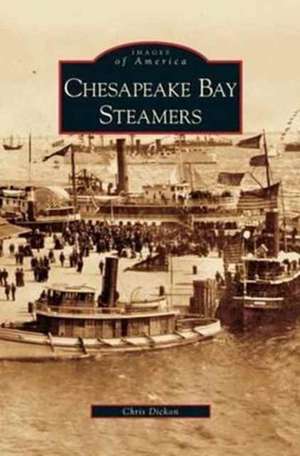Chesapeake Bay Steamers
Autor Chris Dickonen Limba Engleză Hardback – 31 oct 2006
| Toate formatele și edițiile | Preț | Express |
|---|---|---|
| Paperback (1) | 133.41 lei 3-5 săpt. | |
| Arcadia Publishing (SC) – 31 oct 2006 | 133.41 lei 3-5 săpt. | |
| Hardback (1) | 181.89 lei 6-8 săpt. | |
| Arcadia Library Editions – 31 oct 2006 | 181.89 lei 6-8 săpt. |
Preț: 181.89 lei
Nou
Puncte Express: 273
Preț estimativ în valută:
34.81€ • 36.41$ • 28.91£
34.81€ • 36.41$ • 28.91£
Carte tipărită la comandă
Livrare economică 03-17 aprilie
Preluare comenzi: 021 569.72.76
Specificații
ISBN-13: 9781531626679
ISBN-10: 153162667X
Pagini: 130
Dimensiuni: 170 x 244 x 10 mm
Greutate: 0.41 kg
Editura: Arcadia Library Editions
ISBN-10: 153162667X
Pagini: 130
Dimensiuni: 170 x 244 x 10 mm
Greutate: 0.41 kg
Editura: Arcadia Library Editions
Notă biografică
Chris Dickon is an Emmy-awarded former broadcast producer whose work develops new information about the human results of Americans at war. He has written about the places where named American war dead are still buried, the role of Americans in the non-American forces of the two world wars, and the social results of U.S. military racial policy and practice in Europe. He lives in Portsmouth, Virginia.
Descriere
Descriere de la o altă ediție sau format:
Since English settlers first touched the shore of the new country in 1607, the Chesapeake Bay has been a multifaceted engine of American history and commerce. The body of inland tidal water between the largest bay cities, Norfolk and Baltimore, was large enough to be the setting of adventure and close enough to allow smaller towns and cities to grow up on its shores. The common community came to life with the technologies of steamboats that could cover the long distances between North and South relatively quickly. Steamers filled in the nooks and crannies of the bay's geography, and by the mid-19th century, the skies over the bay were lined with dark, waterborne contrails in all directions. Strong machines built to master rough seas while moving gently enough for small harbors, many steamers had life spans that crossed whole eras in American history. Some were drafted into distinguished service in domestic and foreign wars. The steamers plied the bay and its rivers with a feminine grace well into the mid-20th century, when they were overtaken by the rush of modern times. The last steamer sailed into oblivion exactly 150 years after the first of them appeared in Baltimore harbor.
Since English settlers first touched the shore of the new country in 1607, the Chesapeake Bay has been a multifaceted engine of American history and commerce. The body of inland tidal water between the largest bay cities, Norfolk and Baltimore, was large enough to be the setting of adventure and close enough to allow smaller towns and cities to grow up on its shores. The common community came to life with the technologies of steamboats that could cover the long distances between North and South relatively quickly. Steamers filled in the nooks and crannies of the bay's geography, and by the mid-19th century, the skies over the bay were lined with dark, waterborne contrails in all directions. Strong machines built to master rough seas while moving gently enough for small harbors, many steamers had life spans that crossed whole eras in American history. Some were drafted into distinguished service in domestic and foreign wars. The steamers plied the bay and its rivers with a feminine grace well into the mid-20th century, when they were overtaken by the rush of modern times. The last steamer sailed into oblivion exactly 150 years after the first of them appeared in Baltimore harbor.







